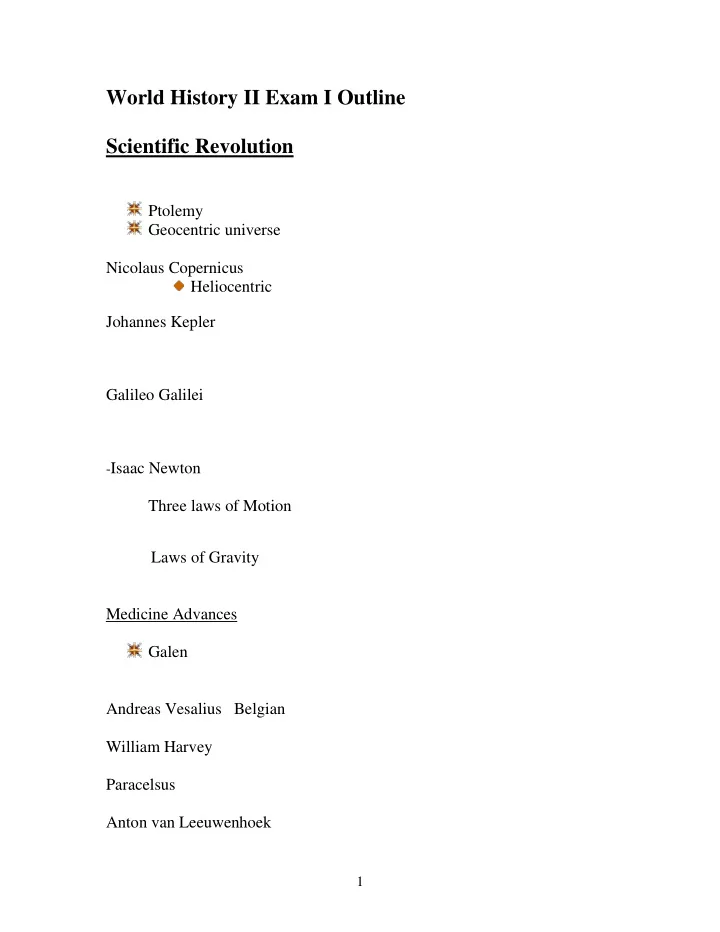

World History II Exam I Outline Scientific Revolution Ptolemy Geocentric universe Nicolaus Copernicus Heliocentric Johannes Kepler Galileo Galilei - Isaac Newton Three laws of Motion Laws of Gravity Medicine Advances Galen Andreas Vesalius Belgian William Harvey Paracelsus Anton van Leeuwenhoek 1
Women in the Origins of Modern Science Margaret Cavendish Madame du Châtelet Science and Women Scientific Method Francis Bacon Rene Descartes Religion in the Seventeenth Century Pascal Enlightenment Outline Reason The Philosophes and their Ideas Paris, France Deism Political Thought Thomas Hobbes 2
John Locke Examples of Key Philosophes Kant Montesquieu, Voltaire, Diderot Immanuel Kant Montesquieu Voltaire Denis Diderot Enlightenment and Economic Thought Adam Smith The Later Enlightenment Rousseau - The “Woman’s Question” in the Enlightenment Mary Wollstonecraft , Vindication of the Rights of Woman, 1792 3
Social Environment of the Philosophes Salons Culture during the Enlightenment Baroque & Classical Music Wolfgang Amadeus Mozart Society and the Enlightenment Schools and Universities Crime and Punishment Religion and the Churches Significance of the Enlightenment Enlightened Despotism, 18 th Century Outline I. War of Spanish Succession, 1702-13 II. Enlightened Absolutism? 4
III. Top European Powers in the 18th Century France Britain Austria Prussia Russia France Bourbons Great Britain: Act of Union United Kingdom Parliament House of Hanover – King George I George II, George III Absolutism in Central Europe: Austria & Prussia 3. Austria, Habsburgs 4. Prussia Hohenzollerns Junkers Frederick the Great 5
5. Russia Romanovs IV. War of Austrian Succession (1740-48) Charles VI Pragmatic Sanction Maria Theresa Silesia V. Seven Years War 1756-63 VI. Catherine the Great Pugachev Rebellion VII Joseph II VIII. Partition of Poland 6
French Revolution Ancien Régime: Louis XVI, Marie Antoinette Marie Antoinette Causes of the French Revolution Estates General First Estate Second Estate Third Estate Jacques Necker Tennis Court Oath Robespierre Bastille, July 14, 1789 Declaration of the Rights of Man and Citizen Marat Women’s March to Versailles Constitutional Monarchy 7
“Liberty , Equality, Fraternity” Citizens Catholic Church Varennes, June 1791 Émigrés Foreign Intervention Brunswick Manifesto Tuileries Valmy French Republic Girondins Jacobins September Massacre Sans-culottes Execution of King & Queen French Women’s Movement & Key Women Figures during the Revolution Olympe de Gouges Madame de Staël Charlotte Corday Madame Roland Terror 8
Committee of Public Safety Robespierre De-Christianization Georges Danton Reaction and the Directory Napoleon Bonaparte Josephine de Beauharnais French in Egypt Nelson Republic of France First Consul 1799 French Empire Concordat Civil Code Coalitions Austerlitz Jena Tilsit Holy Roman Empire dissolved 1806 9
Rhineland Confederation Austrian Empire Grand Duchy of Warsaw Problems of the Grand Empire Great Britain Trafalgar 1805 Nelson Continental System Nationalism Spain Marie Louise Fall of Napoleon Invasion of Russia, 1812 Battle of Nations 1813 Elba Waterloo 1815 Wellington Von Blücher St. Helena 10
Restoration, Reaction, Revolution, and Romanticism, 1815-1850 Congress of Vienna, 1814-15 Castlereagh Hardenberg Alexander Metternich Louis XVIII German Confederation Rejected republicanism Conservatism Concert of Europe Greece Conservatism German Confederation Karlsbad Degrees Russia Nicholas I 11
Ideologies of Change Liberalism Nationalism Revolution and Reform, 1830-1850 Revolutions of 1848 2nd Republic • Napoleon III Revolution : Central Europe, March 1848 Frankfurt Parliament 1848-49 Failure of the 1848 Frankfurter Parliament Revolution in Austria Palacký Hungarian War of Independence 1848-49 Bach Franz Joseph Italy Mazzini 12
Romanticism Johann Wolfgang von Goethe Friedrich Schiller Heinrich Heine Mary Wollstonecraft Shelley Caspar David Friedrich Eugène Delacroix Romanticism & Music Ludwig van Beethoven 13
Industrial Revolution Great Britain Agricultural revolution New Technology Hargreave Cartwright Steam engine Watt British centers of industry Transportation Revolution Steamboats Canals Roads Railroad Spread of Industrialization British monopoly Great Exhibition: Britain 1851 Queen Victoria & Albert 14
Limiting the Spread of Industrialization Friedrich List Zollverein Bad working conditions Efforts at Change Opponents of Industry Artisans Unions Population Growth Urbanization Class in Urban Europe 15
Recommend
More recommend